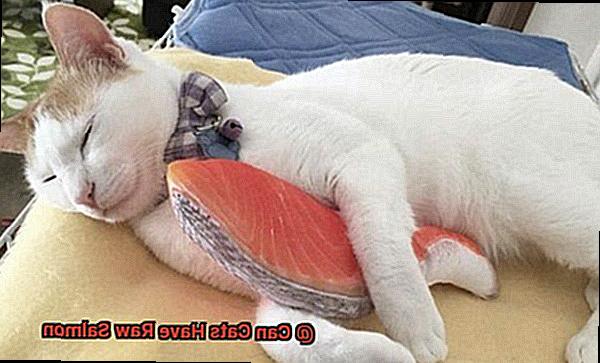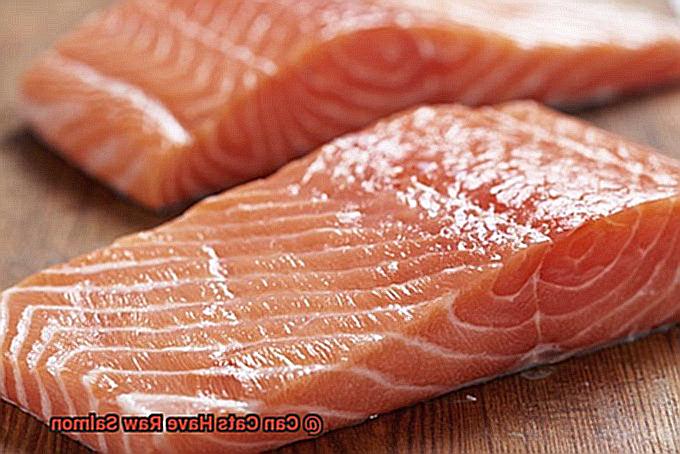Can cats eat raw salmon? Many pet owners have asked this question, and the answer may surprise you. Yes, cats can safely enjoy raw salmon as part of their diet.
Cats are obligate carnivores, meaning they rely heavily on animal proteins for energy and nutrition. Raw salmon is high in essential fatty acids, vitamins and minerals that provide vital nutrients to your kitty’s body.
But there are some potential dangers associated with feeding your cat raw fish. Parasites or bacteria could make your cat sick if not properly handled or cooked before eating.

Wild-caught salmon may contain mercury or other pollutants that can be harmful to your pet’s health. So how can you feed your cat raw salmon safely?
Make sure to buy only fresh sushi-grade fish from a reputable source. Then freeze the salmon for at least two weeks before serving it to remove any parasites or bacteria present in the dish.
Finally, cook the fish thoroughly before handing it to your cat; doing so will ensure that no toxins in the fish have been destroyed by heat. Now you know: Can cats have raw salmon?
The answer is yes – but only if you follow these guidelines.
The Dangers of Feeding Cats Raw Salmon
Raw salmon can be a dangerous choice when it comes to feeding cats.
Contamination with parasites such as flukes, tapeworms, and roundworms can cause severe health issues ranging from vomiting and diarrhea to abdominal pain and even death. Additionally, cats are at risk of contracting salmon poisoning disease (SPD), which is caused by a parasite found in raw fish.
Symptoms of SPD include fever, lethargy, dehydration, and vomiting. Moreover, mercury poisoning is a risk if cats consume large quantities of raw salmon skin.
This heavy metal can lead to tremors, seizures, and even death. Given the potential health risks associated with raw salmon, it is best to feed cats cooked salmon instead.
Make sure to debone and skin the fish before serving it to your feline friend in order to prevent gastrointestinal blockages or other problems.
Can Cats Eat Cooked Salmon?
The answer is yes – but with a few caveats.
Firstly, it’s essential to ensure that the salmon is boneless and has had the skin removed. This will help reduce the chance of choking or digestive problems.
On the plus side, if you’re feeding your cat cooked salmon in moderation, it can provide a range of nutritional benefits, including protein, omega-3 fatty acids, and other essential vitamins and minerals that can help support their overall wellness.
Is Cooked Salmon Skin Safe for Cats?
Cooked salmon skin can be a delicious and nutritious snack for cats, but it’s important to take certain safety precautions when feeding it.
Preparing the salmon in the right way is key to ensure your kitty can enjoy a hearty meal without any digestive issues. Start by removing any bones, skin, or excess fat from the salmon before cooking.

Cut the skin into small pieces and sauté it without adding seasoning or oils. You can steam, boil, or bake the salmon skin until it’s cooked all the way through.

Before introducing cooked salmon skins to your cat’s diet, be sure to consult with your veterinarian first. They’ll be able to provide advice on the appropriate amount and frequency of feeding based on your cat’s individual needs and any underlying medical condition.
It’s worth noting that while cooked salmon skin is high in omega-3 fatty acids, protein, and essential nutrients such as calcium and vitamin D, some cats may have difficulty digesting it which could lead to digestive upset or pancreatitis.
Can Kittens Eat Salmon Raw?
It’s not a good idea to feed your precious kitten raw salmon.
Neorickettsia helminthoeca, a dangerous bacteria found in raw salmon, can cause a potentially fatal disease in cats called Salmon Poisoning Disease (SPD). Symptoms of SPD include vomiting, fever, diarrhea, lethargy, dehydration and swollen lymph nodes around the head and neck.
If left untreated, SPD can lead to organ failure and even death. Cooking salmon will help to eliminate this harmful bacteria, making it safe for cats to eat in moderation.
However, it’s always best to consult with a veterinarian before introducing any new food item to your kitten’s diet. To ensure your kitten is getting all the nutrition they need for healthy growth and development, try giving them a high-quality kitten-specific diet that meets their nutritional needs.
Avoid feeding them table scraps or human food as this can upset their digestive system and cause health problems. In conclusion: while raw salmon may be delicious for humans, it is not suitable for kittens.
Cooking salmon can make it safe for cats to eat in moderation but always speak with a veterinarian before introducing any new food into your kitten’s diet.
Are There Any Alternatives to Raw or Cooked Salmon?
When it comes to providing your beloved cat with a nutritious and balanced diet, raw or cooked salmon may not always be the best option.
The risk of harmful bacteria and parasites can be too great for cats. Luckily, there are plenty of alternatives to choose from.
From other types of cooked fish like tuna or sardines, to high-quality commercial cat food that contains salmon as a main ingredient, to fish oil supplements that provide the same benefits without any risk.
Can Cats Eat Raw Tuna or Other Fish?
When it comes to feeding your cat fish, you need to be aware of the potential risks.
Although cats love fish, raw tuna and other types of raw fish can be extremely dangerous for them to consume. Bacterial infections such as salmonella or E. coli can cause serious health problems, including vomiting, diarrhea and even death.

Furthermore, consuming raw fish can lead to a thiamine deficiency, which can cause neurological issues and muscle weakness due to the enzyme that breaks down thiamine in raw fish. If you want to feed your cat fish, it’s best to opt for cooked fish instead.
This will help to kill off any harmful bacteria and reduce the risk of bacterial infections. However, not all cooked fish is safe for cats; certain types of cooked fish, such as salmon with skin on, should be avoided because they can cause digestive issues.
It’s important that you consult your veterinarian before feeding your cat any type of fish or preparation method.
Is Feeding Your Cat Raw Fish Safe?
When it comes to feeding your cat, you may want to think twice before giving them raw fish.
While cats love the taste of fish, especially salmon, there are potential risks associated with raw seafood that could put their health in danger. Raw fish can contain bacteria such as Salmonella and Listeria, which can cause diarrhea in cats and humans alike.
In addition, parasites such as tapeworms can be present in raw fish, leading to digestive issues for cats. Perhaps most importantly, raw fish contains an enzyme called thiaminase that breaks down thiamine (a B vitamin) in the body.
A thiamine deficiency can result in loss of appetite, seizures, and abnormal behavior in cats. To keep your feline friend happy and healthy, it’s best to avoid giving them raw fish altogether.
If you’re planning on feeding your cat cooked fish, be sure to consult with your veterinarian first to determine which kind and preparation is safe for cats.

DMQggDlEJnM” >
Tips for Introducing Your Cat to New Foods
Introducing a new food to your cat can be a challenging task, but with patience and perseverance, it can be done successfully. Here are nine tips to help you introduce your cat to new foods effectively.
Start Small
Begin by offering your cat small amounts of the new food mixed with their regular food. Gradually increase the amount over several days.
Monitor Reactions
Keep an eye on your cat for any signs of adverse reactions such as vomiting, diarrhea, or decreased appetite.
Consider Nutrition
Ensure that the new food is nutritionally balanced and meets your cat’s dietary needs.
Experiment with Textures
Cats can be picky about texture, so try different textures such as canned, dry, or semi-moist to find one that your cat prefers.
Avoid Seasonings and Spices
Do not add any seasonings or spices to your cat’s food as they can upset their digestion.
Use Positive Reinforcement
Offer verbal praise or treats to encourage your cat to try new foods and create a positive association with them.
Be Patient
It may take some time for your cat to become accustomed to a new food; don’t get discouraged if they don’t take to it right away.
Consult With Your Veterinarian
If you have any concerns or questions about introducing new foods to your cat, consult with your veterinarian for guidance and assistance.
Avoid Raw Salmon
Also Read: Can Cats Eat Fish Skin? – 21Cats.org
Conclusion
Can cats have raw salmon? The answer is yes – but with caution.
Wild-caught salmon may contain parasites, bacteria, mercury or other pollutants that can be harmful to your pet’s health.
To ensure your cat’s safety, buy only fresh sushi-grade fish from a trusted source and freeze it for at least two weeks before serving it. Cooked salmon is also an option and can provide a variety of health benefits such as protein, omega-3 fatty acids, and essential vitamins and minerals.
When in doubt, consult with your veterinarian first before introducing any new food item into your cat’s diet.







